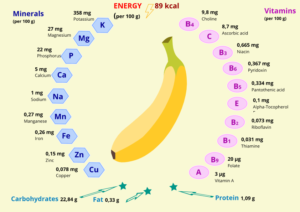Bananas contain fiber as well as vitamins and minerals that may provide health benefits.
Bananas are among the most important food crops on the planet.
They come from a family of plants called Musa that are native to Southeast Asia and grown in many of the warmer areas of the world.
Bananas are a healthy source of fiber, potassium, vitamin B6, vitamin C, and various antioxidants and phytonutrients.
Many types and sizes exist. Their color usually ranges from green to yellow, but some varieties are red.
This article tells you everything you need to know about bananas.

Nutrition facts
The nutrition facts for 1 medium-sized banana (100 grams) are:
- Calories: 89
- Water: 75%
- Protein: 1.1 grams
- Carbs: 22.8 grams
- Sugar: 12.2 grams
- Fiber: 2.6 grams
- Fat: 0.3 grams
Carbs
Bananas are a rich source of carbs, which occur mainly as starch in unripe bananas and sugars in ripe bananas.
The carb composition of bananas changes drastically during ripening.
The main component of unripe bananas is starch. Green bananas contain up to 80% starch measured in dry weight.
During ripening, the starch is converted into sugars and ends up being less than 1% when the banana is fully ripe.
The most common types of sugar in ripe bananas are sucrose, fructose, and glucose. In ripe bananas, the total sugar content can reach more than 16% of the fresh weight.
Bananas have a relatively low glycemic index (GI) of 42–58, depending on their ripeness. The GI is a measure of how quickly carbs in food enter your bloodstream and raise blood sugar.
Bananas’ high content of resistant starch and fiber explains their low GI.
Fibers
A high proportion of the starch in unripe bananas is resistant starch, which passes through your gut undigested.
In your large intestine, this starch is fermented by bacteria to form butyrate, a short-chain fatty acid that appears to have beneficial effects on gut health.
Bananas are also a good source of other types of fiber, such as pectin. Some of the pectin in bananas is water-soluble.
When bananas ripen, the proportion of water-soluble pectin increases, which is one of the main reasons why bananas turn soft as they age.
Both pectin and resistant starch moderate the rise in blood sugar after a meal.
SUMMARY
Bananas are mainly composed of carbs. Unripe bananas may contain decent amounts of resistant starch, which functions like fiber, aiding your gut and promoting healthy blood sugar levels.
Vitamins and minerals
Bananas are a good source of several vitamins and minerals, especially potassium, vitamin B6, and vitamin C.
- Potassium. Bananas are a good source of potassium. A diet high in potassium can lower blood pressure in people with elevated levels and benefits heart health.
- Vitamin B6. Bananas are high in vitamin B6. One medium-sized banana can provide up to 33% of the Daily Value (DV) of this vitamin.
- Vitamin C. Like most fruit, bananas are a good source of vitamin C.
SUMMARY
Bananas contain a number of vitamins and minerals in decent amounts. These include potassium and vitamins B6 and C.
Other plant compounds
Fruits and vegetables contain numerous types of bioactive plant compounds, and bananas are no exception.
- Dopamine. Although it is an important neurotransmitter in your brain, dopamine from bananas doesn’t cross the blood-brain barrier to affect mood. Rather, it acts as an antioxidant.
- Catechin. Several antioxidant flavonoids are found in bananas, most notably catechins. They have been linked to various health benefits, including a reduced risk of heart disease.
SUMMARY
Like other fruits, bananas contain several healthy antioxidants, which are responsible for many of their health benefits. These include dopamine and catechin.
Health benefits of bananas
Bananas boast a number of health benefits.
Heart health
Heart disease is the world’s most common cause of premature death.
Bananas are high in potassium, a mineral that promotes heart health and normal blood pressure. One medium-sized banana contains around 0.4 grams of this mineral.
According to a large analysis of many studies, daily consumption of 1.3–1.4 grams of potassium is linked to a 26% lower risk of heart disease.
In addition, bananas contain antioxidant flavonoids also associated with a significant decrease in heart disease risk.
Digestive health
Unripe, green bananas contain considerable amounts of resistant starch and pectin, which are types of dietary fiber.
Resistant starch and pectins act as prebiotic nutrients, supporting the growth of beneficial gut bacteria.
In your gut, these fibers are fermented by beneficial bacteria that form butyrate, a short-chain fatty acid that promotes gut health.
SUMMARY
Bananas may be beneficial for heart health due to their high levels of potassium and antioxidants. What’s more, their resistant starch and pectins may promote colon health.
Banana downsides
There are mixed opinions on whether bananas are good for people with type 2 diabetes.
It’s true that bananas are high in starch and sugar. Thus, one might expect them to cause a large rise in blood sugar.
But due to their low GI, moderate consumption of bananas should not raise blood sugar levels nearly as much as other high-carb foods.
That said, people with diabetes should avoid eating a lot of well-ripened bananas. It’s always best to monitor blood sugar levels carefully after consuming high amounts of sugar and carbs.
On a different note, some studies indicate that this fruit is a risk factor for constipation, while others claim that bananas may have the opposite effect.
When consumed in moderation, bananas do not have any serious adverse effects.
SUMMARY
Bananas are generally considered healthy. However, people with type 2 diabetes should avoid a high intake of well-ripened bananas.
The bottom line
Bananas are among the world’s most commonly consumed fruits.
Primarily composed of carbs, they contain decent amounts of several vitamins, minerals, and antioxidants. Potassium, vitamin C, catechin, and resistant starch are among their healthy nutrients.
Bananas may have numerous benefits — including improved heart and digestive health — when consumed regularly as a part of a healthy lifestyle.
